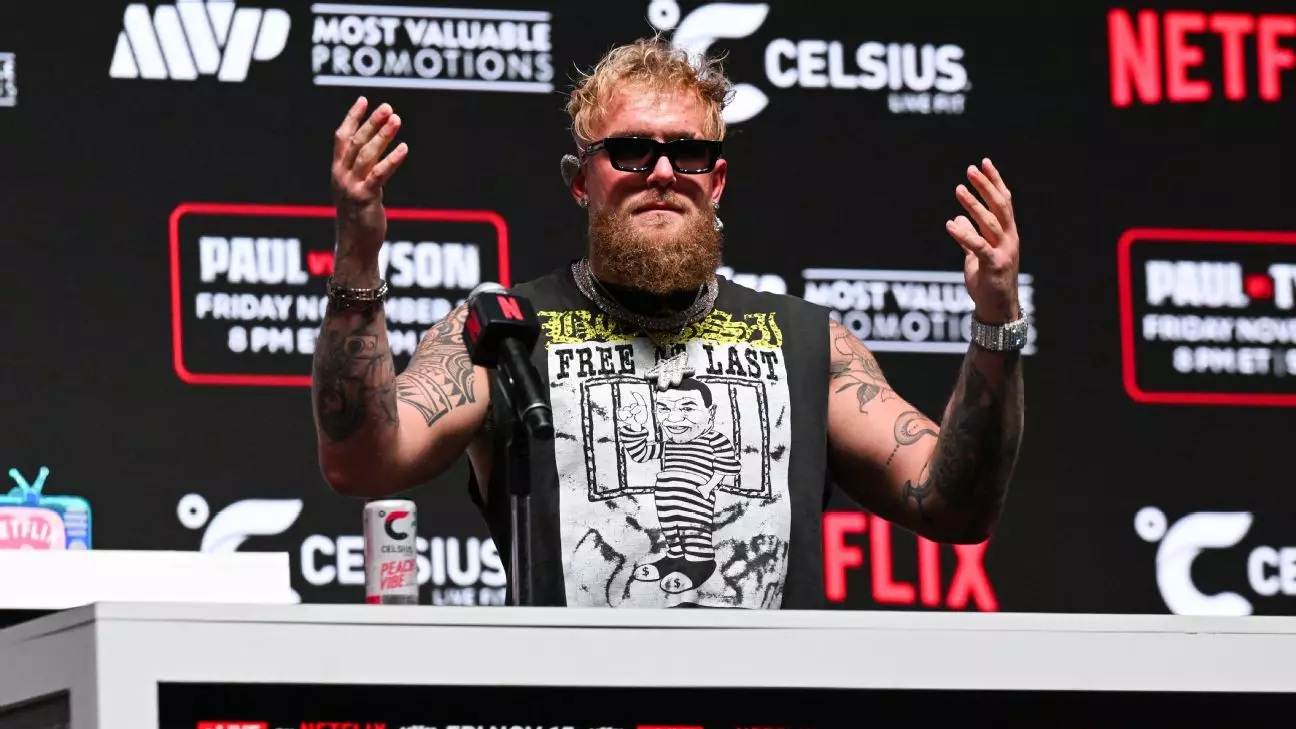In the sphere of professional boxing, the dynamics have significantly evolved over recent years, largely due to non-traditional figures entering the sport. Chief among them is Jake Paul, a notorious name that elicits strong opinions across the board. As Paul gears up for an unprecedented match against the legendary Mike Tyson, a 58-year-old icon with an unparalleled legacy in the sport, both anticipation and skepticism are palpable. Paul embodies a “love him or hate him” persona, reflective of broader trends in celebrity culture where fame is often accompanied by controversy.
Although Paul boasts an impressive record of 10 wins with only one loss, comprising seven knockouts, the legitimacy of this accomplishment is under scrutiny. His journey from social media influencer to professional boxer has been anything but conventional, raising questions about the quality of competition he chooses. Critics point out that his opponents have frequently been other YouTubers or fighters from mixed martial arts, leading to ongoing debates about whether he truly belongs in the boxing arena with established legends like Tyson.
At a recent press conference, the disparity in fan support was strikingly evident. The overwhelming affection directed towards Tyson contrasted sharply with the animosity directed at Paul. Rather than shying away from this negative reception, Paul appears to relish it, stating, “I don’t care about their opinions because I’ve seen what people cheer for.” His willingness to be seen as the villain in this narrative has bolstered his brand, transforming him into a master of self-promotion.
This narrative of the anti-hero is not new to sports or entertainment. Throughout history, audiences have been captivated by figures who challenge norms and incite strong reactions. Paul acknowledges this phenomenon, emphasizing the calculated nature of his persona: “I tell people I’m purposely pissing them off, and then they still hate me.” Such transparency serves two purposes; it creates drama and engagement, increasing interest in the bout itself. After all, conflict is a key ingredient in drawing viewership, whether through admiration for the hero or disdain for the villain.
In a world where the line between genuine competition and spectacle continues to blur, Paul’s approach is emblematic of a larger trend in sports entertainment. By positioning himself as the antagonistic foil to a beloved figure like Tyson, he not only heightens expectations for the event but also leverages this tension for commercial gain. There is an inherent risk in this strategy, especially against a fighter with the reputation and ferocity of Tyson, who hasn’t entered the ring in an official capacity for almost two decades.
However, Paul seems undeterred, embracing the spotlight with promises that the fight will not go the distance. His bravado in calling out the older fighter reflects both confidence and strategy; it builds hype and can potentially draw in an audience seeking the thrill of conflict. Amidst this bravado, he communicates a desire for Tyson to channel his past ferocity, suggesting that nothing would satisfy him more than facing a fierce challenge.
Jake Paul’s rise to prominence is indicative of a cultural moment where celebrity boxing draws significant interest, often overshadowing traditional contentions in the sport. It prompts critical reflections on the legitimacy of boxing as both a sport and a performative spectacle. Fans must grapple with the idea that might not only apply to technical prowess in the ring but also to the spectacle encircling it.
As the boxing world braces for what could be a groundbreaking fight, debate continues about whether Paul is merely an entertainer or a legitimate competitor. The answer may depend less on boxing stats and more on the resonance of his narrative with viewers. In this instance, he has successfully blurred the lines, inviting not only boxing enthusiasts but also casual viewers drawn by the drama, conflict, and overarching storyline.
Ultimately, whether or not Jake Paul stands victorious against Mike Tyson, he has already secured his place in boxing history as a striking figure of modern sport—one that challenges the very definitions of heroism and villainy in the most public of arenas.


Leave a Reply